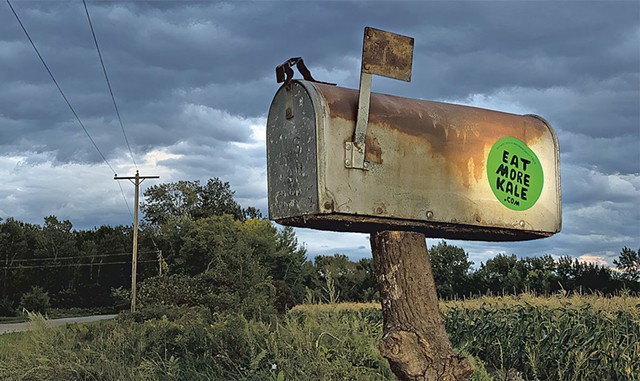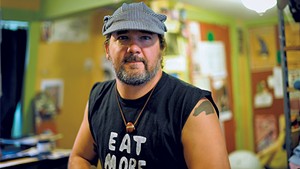
- Courtesy Of Patrick Kennedy
- A DISINGENUOUS DUDE? Lantz's documentary takes a hard look at Moore's quest to trademark the phrase "Eat More Kale."
Ten years ago, a T-shirt maker filed a trademark application. A megacorp sent him a cease-and-desist letter. He objected, vociferously. And the story of Eat More Kale sped around the world.
Tuesday saw the world premiere in Burlington of Vermont and the Bright Green Nothing, a crowdfunded documentary about Bo Moore's quest to trademark his catchy recommendation of leafy greens. Directed by James Lantz, the film has been in the works since 2012.
The deal
In 2011, Montpelier artist Moore applied for a trademark for the phrase "Eat More Kale," which he'd been printing on T-shirts and stickers since around the turn of the millennium. Fast-food giant Chick-fil-A, which uses the slogan "Eat mor chikin," sent him a letter telling him that, in essence, the phrase "Eat more" was its corporate property.
Calling the face-off a "David-versus-Goliath" battle, Moore mobilized his army of Facebook fans. A petition was signed. Funds were raised. The New York Times reported on the controversy. The governor of Vermont held a press conference in support of Moore. Outrage against the corporate bully ran high, with additional fuel from Chick-fil-A's history of donating to anti-LGBTQ causes.
In 2015, Moore finally received his trademark. It was a victory for the little guy ... or was it?
(For a detailed timeline of the Eat More Kale affair and the film's production, see my November 9 story "'Eat More Kale' Documentary to Premiere Next Week.")
Will you like it?
Vermont and the Bright Green Nothing is a fascinating case study in documentary filmmaking, because its thesis clearly evolved as Lantz delved into his subject. The film's original title, A Defiant Dude, promised an unambivalent celebration of Moore and his fight against a trademark bully. What emerged is nothing of the kind.
For one thing, Lantz opens the film with a different Vermont trademark battle. Over just 21 days in 2009, we're told, the Morrisville owner of Rock Art Brewery successfully asserted his right to call a beer the Vermonster against the giant Monster Energy drinks, which had claimed that the name infringed on its trademark.
Why, then, did Eat More Kale's battle take four years? Foot-dragging by the U.S. Patent and Trademark Office was one factor. But Lantz mounts a convincing case that Moore and his legal team also played a role. He suggests that Moore had solid business reasons to prolong the case, describing him as "profiteering" off the resulting publicity, "gaming the system," "obfuscating" and sometimes even "flat-out lying."
If Moore misrepresented his case to the public, though, he had lots of help. His supporters — and, yes, even the media — routinely referred to Chick-fil-A's "lawsuit" against him. In fact, as Lantz points out, Chick-fil-A never sued Moore. Its last communication with him was the 2011 cease-and-desist letter. The "lawsuit" was a convenient fiction to support the David-and-Goliath narrative.
If this makes the doc sound like a hit piece on Moore, it's not. Lantz has bigger concerns — namely, the very real phenomenon of trademark bullying. While Moore may have hyped up his case to sell more T-shirts, his homespun hucksterism pales in comparison with the cold-blooded actions of corporate lawyers. For instance, Lantz cites the case of Entrepreneur Media, which seems determined to sue every business with "entrepreneur" in its name into oblivion.
And so the film's narrative develops layers on layers of complexity. Lantz suggests that Moore's case was actually a clash of two Goliaths: big business and social media outrage. Moore exploited the latter with aplomb, and his viral Facebook posts helped to right a potential wrong. In the process, however, Facebook also spread misinformation about the case, just as it has helped spread far more dangerous misinformation in recent years.
Setting the record straight means getting deep into the weeds of intellectual property law. To do so, Lantz relies throughout the film on the voice-over narration of Vermont actor Margo Whitcomb. The result sometimes feels like a classroom lecture, though it's enlivened by animated interludes illustrating legal principles.
Lantz also makes intriguing use of the contrast between black-and-white and color photography, using the former for the central narrative (TV news footage, his own interviews with Moore) and the latter for classic Vermont scenes (a general store, a babbling brook) that serve as backdrop for narration or graphics. Normally, the rustic footage would come across as inessential B-roll, but the color gives it immediacy. By contrast, black-and-white film highlights the transience of virality online, where outrage is the greatest motivator.
For Moore, outrage was also a moneymaker, and it's hard to begrudge him his success. But Lantz's doc might make you think twice about online heroes and villains — and about underdog stories that seem just a little too good to be true. Perhaps that color footage is the filmmaker's way of suggesting that, while "bright green nothings" such as the Eat More case may come and go, Vermont abides.
If you like this, try...
Copyright Criminals (2009; Pluto TV, Vudu, Tubi, rentable): Trademark law may not be the sexiest issue, but in the music world, as this documentary shows, intellectual property questions get a lot of play.
The Crime of the Century (2021; HBO Max): If Vermont and the Bright Green Nothing has you fired up about corporate malfeasance, there are many docs to whet your ire. The latest from Alex Gibney examines Big Pharma's role in fostering the opioid epidemic. Kale case may come and go, Vermont abides.








Comments
Comments are closed.
From 2014-2020, Seven Days allowed readers to comment on all stories posted on our website. While we've appreciated the suggestions and insights, right now Seven Days is prioritizing our core mission — producing high-quality, responsible local journalism — over moderating online debates between readers.
To criticize, correct or praise our reporting, please send us a letter to the editor or send us a tip. We’ll check it out and report the results.
Online comments may return when we have better tech tools for managing them. Thanks for reading.